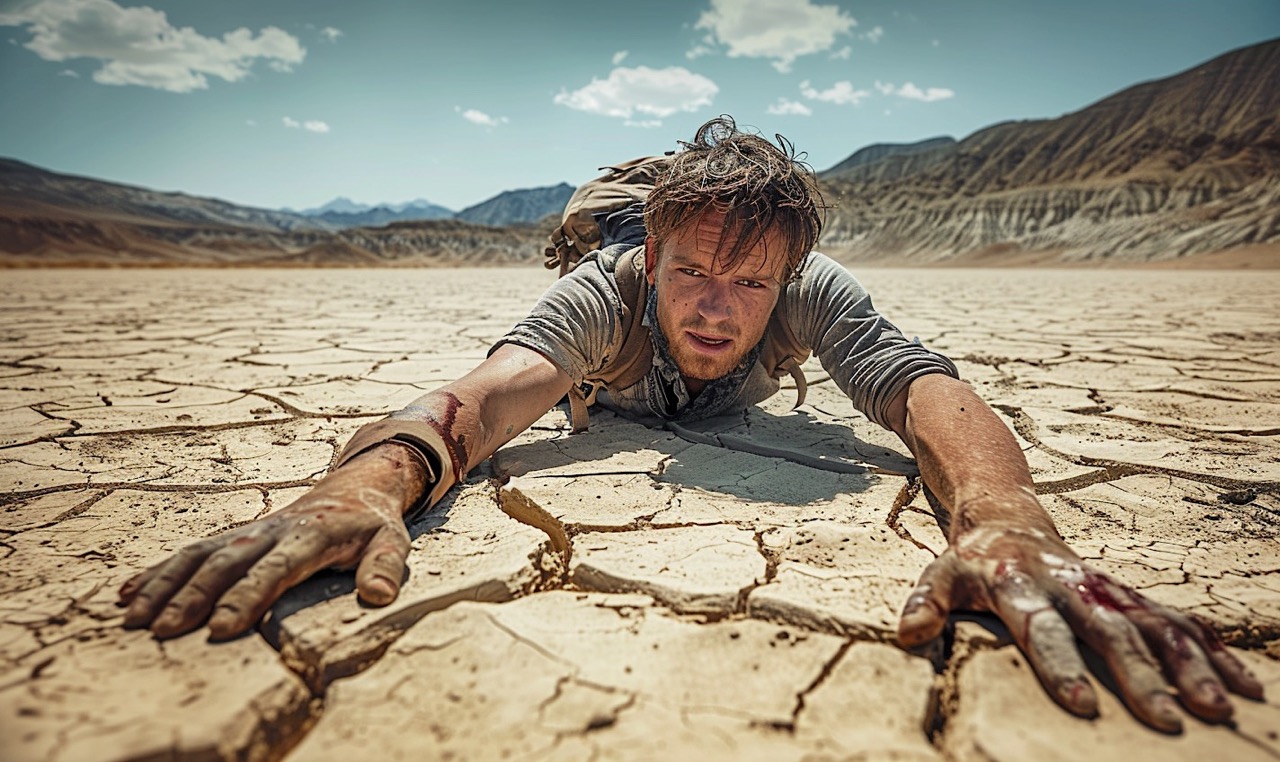Life
4 Ways You Benefit From Going Through a Dry Spell

Whether you’re creatively blocked or your usual motivation or inspiration has left you, one day you will wake up and find yourself in a dry spell. You’ll realize you’re wandering around in a metaphorical desert and have no idea how you became a worn out crispy critter trying to find shade under the nearest rock.
So once you’re in this desert, what signposts should you look for to point you back toward civilization? How do you escape the anxiety that comes with being lost, forsaken, and feeling pressured by the pace of modern society to keep up and get back in the game? You do it by embracing your situation and appreciating the benefits that every dry spell has to offer.
Here are 4 ways you benefit from going through a dry spell:
1. You build resilience
Tough times are an opportunity to reflect on what you’ve accomplished. You didn’t make it to where you are now by accident; you’ve worked hard, gained wisdom, and have probably helped people along the way. Now is the time to reflect on those accomplishments and congratulate yourself for how far you’ve come.
Resilience also allows you to gain perspective about your journey. How has your outlook changed over time? Where have you shifted your viewpoint as you continued to learn and grow? Think about how this perspective shift has allowed you to live a different, and hopefully happier, life and where you’ve continued to succeed despite setbacks.
Lastly, time for reflection wouldn’t be complete if you didn’t also take stock of where you’ve stumbled. Instead of beating yourself up for falling short, look at your stumbles as teachers. How did you learn to regroup and regain your focus? How can you continue to use that power to help you get through what you’re experiencing now?
“Resilience is accepting your new reality, even if it’s less good than the one you had before.” – Elizabeth Edwards
2. You develop perseverance
One of the most important things to remember in a dry spell is that it may be trying to send you a message. To go along with all the reflecting you’re doing, you may also need to learn how to better balance your energy and consider different ways of recharging your battery. In order to come back strong, look at the period of drought you’re experiencing as a time to step back and gain some strength instead of pushing through.
To keep your forward momentum going it’s also important to keep doing the things you do well. Doing these things will give you a sense of accomplishment, help keep your self -esteem up, and allow you to remain engaged, even as you’re struggling.
Don’t be afraid to seek out support from friends and ask others for their thoughts on how you can approach your current challenges. Take comfort in the fact that a dry spell is just that, a spell, not a forever state. It too shall pass and you will feel better at some point.
3. You learn to adapt
Because dry spells don’t usually appear out of nowhere, by the time you’re ready to admit you’re in one, you’ve probably been wandering the desert for a few weeks or more. Finding yourself in this new and inhospitable environment will force you to look at the big picture to figure out what may have caused you to go off track.
Where have you lost sight of how you are rewarded in life? Where are you out of touch with your bigger why? How can you reconnect with what you need mentally, emotionally, spiritually, physically, and financially in order to make peace with where you are and also with where you want to be?
Sometimes dry spells happen because you know you need to shift but you’re resisting the change. Other times, you find yourself wandering and alone because something isn’t quite “right” but you can’t put your finger on it. In either case, the message is always that you must change. With change comes risk, but sometimes change is inevitable. Your willingness to change is optional.
“The more you adapt, the more interesting you are.” – Martha Stewart
4. You learn hidden lessons
The ultimate benefit of being in the uncomfortable and often exhausting state of desert dwelling is the opportunity to learn hidden lessons. The first place to start is by looking for illusions you have about yourself and your situation. A dry spell signals a break; a break in your normal ways of thinking and being.
Where are you adding complexity when you should in fact be simplifying? Where are you making up rules for yourself when you should be letting go? Where are you too unstructured when you should be thinking more linearly? What message is your dry spell ultimately trying to communicate to you and how can you become a better version of yourself by learning the lesson and honoring this message?
By shifting your mindset to one of welcoming vs. one of shunning a dry spell you can help yourself not only survive but actually thrive and come out with increased awareness and knowledge about your situation.
Instead of focusing on the frustration and discouragement of the short term, shift your focus instead to how this time can help you in the long term. Being in a dry spell isn’t permanent, it’s an opportunity to rejuvenate yourself and gain a little wisdom along the way.
What did you learn from going through a dry spell and how did it benefit you in the long run? Leave your thoughts below!
Life
Imposter Syndrome Is Rooted in Your Past But Here’s How You Can Rewire It
Imposter syndrome is most prevalent in highly successful women

Imposter syndrome is “the persistent inability to believe that one’s success is deserved or has been legitimately achieved as a result of one’s own efforts or skills.” (more…)
Life
The Surprising Mental Health Tool You Probably Haven’t Tried
Through journaling, I arrived at a more balanced perspective, it reinstated my sense of gratitude and led me to accept my disability

In two particularly difficult times in my adult life, my journaling practice is helping me heal emotionally. It has been a vital tool for helping me see the bigger picture and land in a place of gratitude. (more…)
Life
How to Stop Comparing Yourself to Others and Find True Happiness
Comparison is the thief of joy; it robs us of our happiness, self-esteem, and peace of mind

In today’s hyperconnected world, it’s easier than ever to fall into the trap of comparing ourselves to others. Social media platforms like Instagram, Facebook, and LinkedIn constantly bombard us with curated highlights of other people’s lives, making it seem like everyone else is happier, more successful, and more fulfilled than we are. (more…)
Life
Harness the ‘Battery Effect’ to Transform Life’s Tensions into Your Greatest Strength
Recharge your life batteries by shifting your mindset today

I believe our life capacity is determined by the skillsets we develop on this spinning rock we call Earth. By “life capacity,” I mean our ability to embrace and sustain joy. (more…)
-

 Did You Know4 weeks ago
Did You Know4 weeks ago7 Surprising Life Lessons Video Games Taught Me That School Never Did
-

 Success Advice4 weeks ago
Success Advice4 weeks agoHow Playing by the Rules Became the Smartest Business Strategy
-

 Success Advice4 weeks ago
Success Advice4 weeks agoHow to Build Trust, Kill Micromanagement, and Lead a Team That Thrives
-

 Success Advice3 weeks ago
Success Advice3 weeks agoSuccess Isn’t Sexy: 5 Daily Habits That Actually Work
-

 Scale Your Business3 weeks ago
Scale Your Business3 weeks agoHow to Build a Workplace People Actually Want to Show Up To
-

 Scale Your Business3 weeks ago
Scale Your Business3 weeks agoHow Smart Entrepreneurs Cut Financial Chaos in Half with One Simple Switch
-

 Success Advice3 weeks ago
Success Advice3 weeks agoBreaking the Bias: How Females Can Thrive In The Workplace in 2025
-

 Scale Your Business3 weeks ago
Scale Your Business3 weeks agoThis Is How Successful Entrepreneurs Manage Their Time Differently






























2 Comments